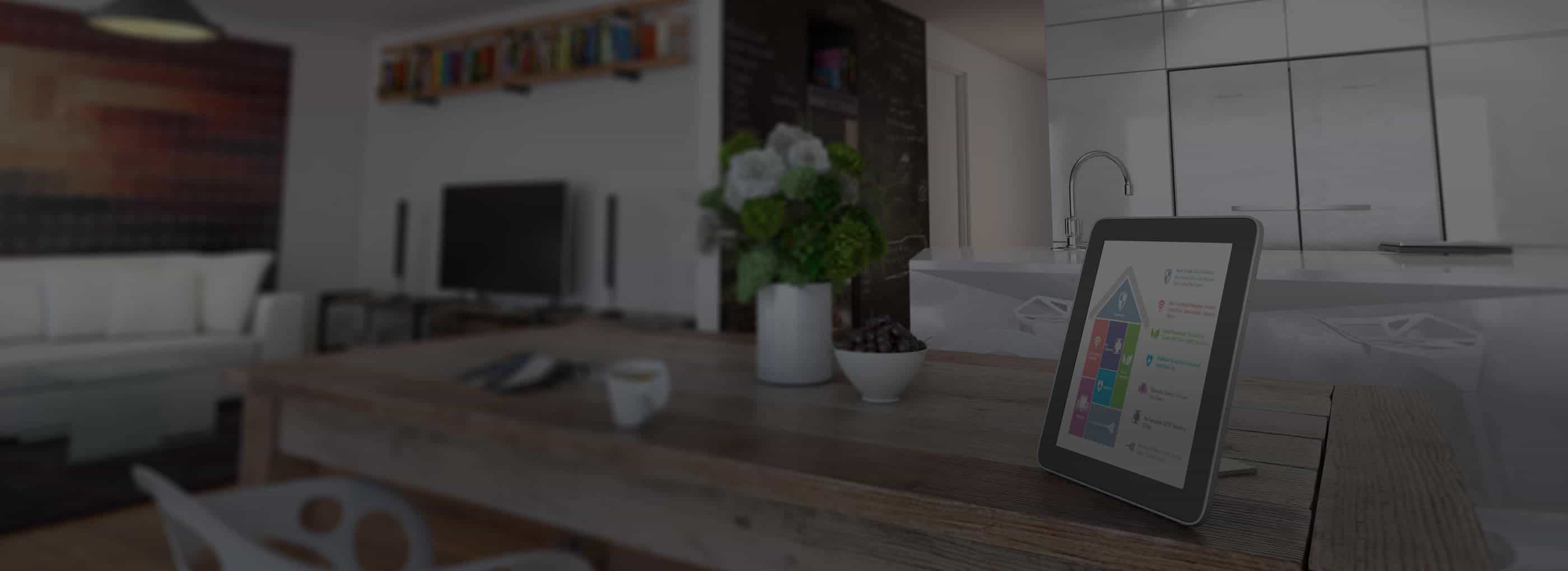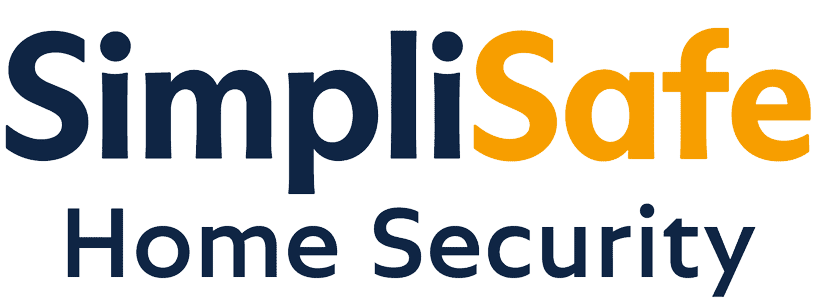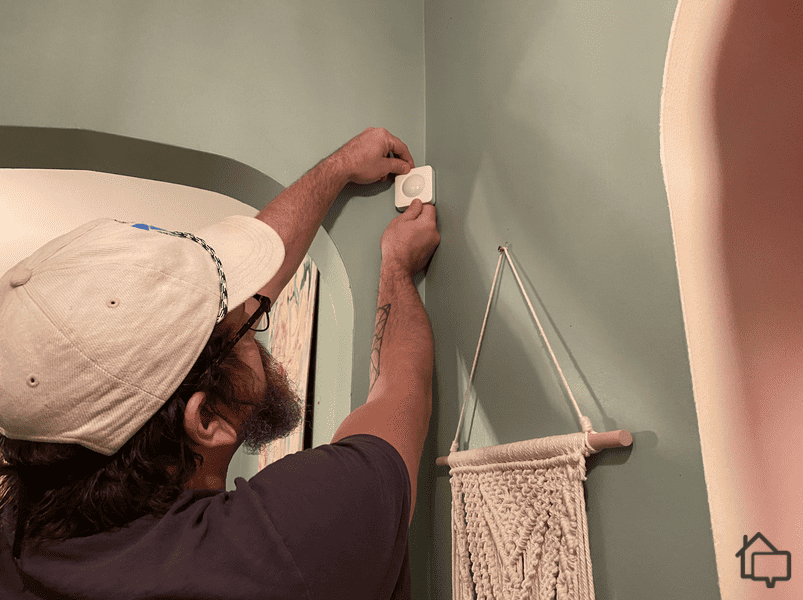The Best Security Systems Without Contracts
After extensive testing, SimpliSafe takes our top spot with its effortless DIY setup, flexible monitoring plans, and innovative home security features.

SafeHome.org may receive compensation from some providers listed on this page. Learn More
We may receive compensation from some providers listed on this page. Learn More

SimpliSafe is one of the most flexible companies out there. With no complicated contracts to sign, you’re never locked into anything. It’s even easy to switch between monitoring plans and scale your system as your security needs change.

Cove may be new to the home security game, but it has already proven itself as a flexible and reliable home security option. With easy DIY installation that rivals SimpliSafe and affordable prices, it’s a strong no-contract option for homeowners and renters on a budget.

ADT used to be known for its long-term contracts and professional installation. But now, they also offer high-quality, easy-to-install equipment to go with their best-in-industry professional monitoring service.



No-contract security systems are more common than you think. Even some of the best home security systems have gone from trying to lock you into a three-year commitment to offering friendlier monthly terms.
Some are DIY home security systems where you install the equipment yourself and monitor it on your terms. Take SimpliSafe for example, our number one pick. SimpliSafe offers affordable equipment, monitoring plans, and innovative burglar-deterrent features. It’s not the only no-contract security system around. Let’s take a closer look at our top picks.
From Anthony Travaglia, Retired Police Officer, Home Security Expert
There’s only one way to make unbiased and trustworthy recommendations, and that’s by testing home security systems ourselves. That means spending our own money to buy the equipment, setting them up in our own homes, and testing each system extensively for weeks and sometimes months. We aim to get a feel for the usability, response time, app, and features of each security system so we can give you honest recommendations based on first-hand experience.
We try our best to compare apples to apples. For example, we install every test unit in the same environment, a two-story, 2,200-square-foot home owned by one of our security experts. We find testing security systems in real houses gives us the most accurate results.
We also buy the same equipment for each test system and install the devices in identical locations. Below is our typical testing setup:
After setting up the test units, we draw upon our extensive expertise to choose the factors most important for the category we are testing for. These are the top-priority items for security systems without contracts:
Using those criteria, here’s how we scored our top picks.

Rating the Best Security Systems Without Contracts
Our team of experts only reviews safety and security equipment. We’re not like those other websites that review everything from robot vacuum cleaners to dishwashers. This approach means we analyze every aspect of a test system to give readers reliable recommendations. The experts who worked on this guide include:
With over 75 years of combined industry experience, we are the most accomplished home security team online. Since SafeHome.org began in 2016, our team has been featured in multiple major outlets, including The Washington Post and The New York Times. Together, we have achieved:
Every recommendation on SafeHome.org is based on first-hand product experience and a deep understanding of the home security industry. Now, let’s learn more about the best security systems without contracts.
| System |
SimpliSafe

|
Cove Security

|
ADT Self Setup

|
Ring Alarm

|
abode

|
|---|---|---|---|---|---|
| Ranking |
1st

|
2nd

|
3rd

|
4th

|
5th

|
| SecureScore™ | 9.2 | 8.8 | 8.6 | 8.2 | 8.0 |
| Best feature | Professional monitoring service | Equipment and monitoring price | Equipment and monitoring | Security cameras | Home automation |
| Equipment package cost | Starts at $250 | Starts at $150 | Starts at $194.98 | Starts at $244.95 | Starts at $159.99 |
| Equipment financing | Yes, via Affirm | No | No | Yes, via Affirm | Yes, via Bread |
| Monthly monitoring fee | Starts at $21.99 | Starts at $19.99 | Starts at $24.99 | $10 add-on | $25.99 |
| Self-monitoring option | Yes | Yes | Yes | Yes | Yes |
| Security cameras | Yes | Yes | Yes | Yes | Yes (limited options) |
| Home automation | Integrations, but limited automation | Yes, but limited integrations | Yes | Yes, but limited integrations | Yes |
| Read our review | SimpliSafe Review | Cove Security Review | ADT Self Setup Review | Ring Alarm Review | abode Review |

SimpliSafe started as a security system for renters, but it’s no longer just that. It offers advanced monitoring features suitable for all sizes of homes, such as Intruder Intervention and Active Guard that use security cameras to deter intruders. But despite all advancements, one thing remained the same: SimpliSafe is still flexible and contract-free. Unlike ADT packages that require a contract, SimpliSafe is contract-free. >> Compare: ADT Vs. SimpliSafe
When we tested SimpliSafe, there was no doubt that Intruder Intervention is the best feature. The monitoring center responded to our break-in simulations via the Wireless Indoor Camera’s two-way talk. This procedure lets them verify alarms and, at the same time, try to deter the intruder. We didn’t expect to see such an advanced feature from a DIY system.
Of course, we had to get a monitoring plan to enjoy Intruder Intervention. It’s available in all professional monitoring plans starting with the $31.99-per-month Core plan. But because SimpliSafe is contract-free, you can freely switch between other available plans.

We created a SimpliSafe security system from the ground-up and could easily integrate more devices any time.
We’ve mentioned that SimpliSafe’s best feature requires professional monitoring, but if you wish to monitor the system yourself, you don’t have to get a subscription. Self-monitoring is free. You could also add cloud storage for up to 10 cameras for $9.99 per month.
If you decide to get professional monitoring, the options are Standard, Core, Pro, and Pro Plus. The last two include Intruder Intervention plus Active Guard. Unlike Intruder Intervention, which works only on the Wireless Indoor Camera, Active Guard works on the SimpliSafe Outdoor Camera Pro and Doorbell Camera Pro. Pro enables the feature overnight (8 pm to 6 am local time), while Pro Plus enables it 24/7.
Here’s a breakdown of SimpliSafe’s subscriptions:
| Standard | Core | Pro | Pro Plus | |
|---|---|---|---|---|
| 24/7 emergency dispatch | Yes | Yes | Yes | Yes |
| Video verification | No | Yes | Yes | Yes |
| Cellular backup | Yes | Yes | Yes | Yes |
| Intruder Intervention | No | Yes | Yes | Yes |
| Active Guard Outdoor Protection | No | No | Yes (8pm to 6am) | Yes |
| Cost | $21.99 per month | $31.99 per month | $49.99 per month | $79.99 per month |
FYI: Subscription fees are non-refundable, which means if you cancel in the middle of your subscription month, it will remain active for the rest of the month. It just won’t renew.
During our break-in simulations of the self-monitoring plan, we received push notifications when motion was detected. Sometimes we didn’t have our phone nearby and missed the alert, which is a risk of having a self-monitoring plan. With our professional monitoring plan, we got text messages within ten seconds and could respond to confirm or cancel the alarm.
>> Keep Reading: Best Security Companies With Fast Response Times
So while a free self-monitoring plan is tempting, we recommend the Core plan so you get Intruder Intervention and alarm texts for added protection. Sure, it’s $31.99 per month, but that’s cheaper than the cost of a Frontpoint system – a DIY alternative that requires a long-term contract.
>> Compare: Frontpoint vs. SimpliSafe
| Monitoring options | Professional and DIY |
|---|---|
| Installation | Professional and DIY |
| Smart platform integration | Alexa and Google Home |
| Equipment cost | Packages starting at $250.96 |
| Monthly monitoring cost | From $21.99 |
| Contract length | Monthly |


Another affordable DIY alternative, similar to the Frontpoint system we reviewed, is Cove. Cove keeps prices low by using eufy security cameras instead of developing its own. The only downside is that you need to use two apps to manage your security system. With cheap professional monitoring plans and no commitments, it’s one of the best no-contract DIY security systems we’ve tested.
Cove offers buy now, pay later via Affirm, but you might not need it since Cove’s pricing is cheaper than SimpliSafe and ADT Self Setup. Cove runs sales throughout the year, although even without discounts it’s one of the most affordable security systems.
Even Cove’s monitoring is more affordable than SimpliSafe’s. Plans start at $9.99 per month, with the most expensive option costing $29.99. That said, Cove offers fewer features than SimpliSafe. Cove doesn’t have anything similar to Intruder Intervention, but you’ll still get text message alerts, cellular backup, and voice control with Alexa and Google Home.
FYI: With the Cove+ monitoring plan, you’ll get $5 per month to go towards extra equipment. It’s a nice little bonus, especially as we intend to add more devices to our system in the future.
Cove’s $9.99 per month self-monitoring plan only comes with camera streaming and alert notifications. That means you have to personally call for help when needed. This is challenging if you’re on vacation or at work. We recommend choosing one of these professional monitoring plans instead.
| Features and cost | Cove Basic | Cove+ |
|---|---|---|
| Monthly cost | $19.99 | $29.99 |
| 24/7 professional monitoring | Yes | Yes |
| Text notifications | Yes | Yes |
| Equipment warranty | 1 year | Lifetime for the life of the plan |
| Video verification | No | Yes |
While there’s no long-term commitment, you need to subscribe to a Cove plan for the equipment to function. You’ll also have to sign up to Cove+ if you use security cameras. But at $29.99 per month, it’s still slightly cheaper than SimpliSafe’s Core plan.
>> Read More: How Much Does a Home Security System Cost?

Cove’s motion sensors shine bright red when they detect movement.
While Cove isn’t as advanced as the Vivint system we tested, it’s still capable of protecting homes. Cove has a built-in 85 dB siren in the main hub and in each touch-screen keypad. You’ll also receive alerts in three ways: text and app notifications within 20 seconds of an alarm trigger, and a phone call within 30 to 45 seconds if you don’t respond.
Did You Know? 92-percent of 911 agents believe having more data about alarms would help them expedite the response process.1 Thankfully, Cove uses RapidSOS to send your details directly to first responders so you don’t have to repeat anything or relay it yourself.
Cove doesn’t offer home automation features like your next pick, ADT. The automation section in the app is only for Alexa and Google Assistant voice commands. If you’re looking for a security system with home automation, scroll down to the abode section below.
| Monitoring options | Professional or DIY |
|---|---|
| Installation | Professional or DIY |
| Smart platform integration | Alexa and Google Home |
| Equipment cost | From $300 for hub and keypad |
| Monthly monitoring cost | From $19.99 |
| Contract length | Monthly |

ADT has ditched lengthy contracts and now offers Self Setup packages with the same high-quality equipment and professional monitoring service it’s famous for. Some of these products come from the Google Nest range. When integrated into the ADT ecosystem, they unlock innovative security features like Trusted Neighbor.
If you’ve read our ADT review, you’ll see how much the company has changed in 150 years. They’ve ditched long-term contracts and the need to call up to order a system.
We went to the website and built our own security system from a smorgasbord of ADT and Google Nest products. There were also a few equipment packages available, but we knew what we needed for our home.
Did You Know? ADT ranks as the most trusted home security system in America. Other brands include SimpliSafe, Ring, and abode, which are all on our list of the best no-contract security systems.2
ADT’s professional monitoring costs for Self Setup start from $24.99, which includes their best-in-industry 24/7 monitoring service, access to the ADT+ app, and home automation features. But because we bought some cameras, we needed the premium option, which is $39.99. It adds cloud storage and video verification.

Our Google Nest Cam works indoors and outdoors, but it requires ADT’s most expensive monitoring plan.
One of the highlights of ADT’s professional monitoring is its text-based alert system. ADT’s SMART monitoring plan sends text messages within ten seconds to you and designated contacts. If there’s no response, ADT follows up with a phone call.
SMART Monitoring connects to police eight times faster than a traditional voice call. While we were testing, the platform let us manage alerts and label them as a false alarm. Another button we spotted was labeled emergency request. We didn’t press it but learned that ADT handles 95 percent of these alarms within 60 seconds.
Beyond those monitoring features we’ve mentioned, ADT’s equipment offers a strong sense of security and safety. For starters, the cameras are made by Google Nest. As you can see in our Google Nest Cam review: these cameras have advanced facial recognition technology. We use this feature to set alerts when our kids get home from school.
The hub is essential to your safety. It has cellular and battery backup that keeps the system online, even if the power is lost during storms.
| Monitoring options | Professional or DIY |
|---|---|
| Installation | DIY |
| Smart platform integration | Alexa and Google Home |
| Equipment cost | Packages starting at $269 |
| Monthly monitoring cost | From $24.99 |
| Contract length | Monthly |


Ring Alarm has some of the best security cameras on the market. Ring is also one of our favorite doorbell camera brands. You can even pair the cameras with other security equipment, such as motion detectors, entry sensors, and smoke alarms. While the product range is limited compared to SimpliSafe and ADT, Ring monitoring plans have some better features, like 180 days of video event history.
We already mentioned that Ring is one of the best security systems with video doorbells, but we also like its security camera range. The Ring Indoor Cam we reviewed was one of the standouts. We could adjust the camera’s motion sensor sensitivity and control how many notifications it sent.
FYI: Ring doesn’t just sell battery-powered cameras. They also have a range of hardwired, solar, and power over Ethernet options.
The Ring Spotlight Cam includes many of the same features. One of the standouts is the 110-decibel siren, which you can use to scare off intruders from the Ring app. We also liked that you can exclude areas to reduce notifications for street traffic and pedestrians.
>> Learn More: Ring Security Camera Costs
All of Ring’s plans are self-monitoring only. If you want professional monitoring, you’ll need to sign up for the Standard or Premium plan and pay a $10 add-on fee. We recommend upgrading, as the Basic plan only covers one doorbell or camera. The Standard and Premium plans cover all your Ring devices in one location. Here’s a quick breakdown of each plan:
| Features and cost | Basic | Standard | Premium |
|---|---|---|---|
| Monthly cost | $4.99 | $9.99 | $19.99 |
| Up to 180 days of video event history | Yes | Yes | Yes |
| Cellular backup | No | Yes | Yes |
| Professional monitoring | No | Yes $10 per month | Yes $10 per month |
| Extended warranties | No | Yes | Yes |
FYI: For extra protection, you can pay an extra $99 per month for a virtual security guard. A highly trained professional is available 24/7 to monitor your home and will personally contact emergency services if needed.
You can also sign up for a one-year subscription and save $40. Besides the discount, you’ll also get a refund for unused months if you cancel partway through. That’s better than brands like Arlo that don’t give prorated refunds.
>> Compare: Arlo vs. Ring comparison.

Our Ring Floodlight Cam also required hardwiring, for which we paid a local electrician to do.
Ring relies heavily on its security camera range to keep you safe. While motion detectors and entry sensors are on the website, we don’t think they match the quality of SimpliSafe or ADT.
>> Read More: Door Alarm Sensors: What They Are and How They’re Used
The professional monitoring also falls short compared to other brands on this list. During testing, we received text messages and phone calls when simulating a break-in. We also found an SOS button in the app that could immediately dispatch police, fire, or medical responses.
Ring also offers real-time intruder deterrence, similar to SimpliSafe. The only catch is it’s an extra $99 per month. The add-on comes with video verification, too. Since SimpliSafe’s Core plan includes these features for just $31.99 per month, we can’t recommend Ring’s upgrade.
| Monitoring Options | 24/7 professional and DIY |
|---|---|
| Installation | DIY |
| Smart Platform Integration | Alexa |
| Equipment Cost | From $244.95 |
| Monthly Monitoring Cost | $4.99 |
| Contract Length | 1-12 months |

Smart home integrations are only available on premium plans with SimpliSafe and ADT. Abode chooses to include it in all subscriptions, including the free one. We even think abode outperforms most other systems because you can set up routines, schedule automations, and integrate third-party devices.
Abode is a great Vivint alternative if you’re looking for a similar customizable system at an affordable price. The standout feature is abode’s CUE automation engine. It lets you customize rules, schedule automations, and set up easy-to-activate routines. We incorporated our Nest Thermostat so it could automatically adjust temperatures before we get out of bed.
Pro Tip: We’re notorious for forgetting to lock the front door when we go for a walk in the morning. But not anymore. we set an automation in the abode app so the door immediately locks every time it closes.
Keep in mind that integrations work even if you don’t have an abode monitoring plan. However, you’ll need one to access abode’s home automation platform, CUE. This is one of the key differences we highlight in our SimpliSafe vs. abode comparison.
The premium self-monitoring option for $7.99 per month includes CUE, camera recordings, 10-day history logs, an in-app panic alarm, and premium customer support. Alternatively, there’s the Pro Plan ($25.99 per month), which comes with professional monitoring.
Home automation aside, abode has pretty big holes to fill when it comes to protecting homes. For starters, it only offers one security camera. It’s an indoor/outdoor camera, but still, it would have been better if it had a camera built specifically for indoor use and a different one built for outdoor use.
Second, abode doesn’t offer that many sensors. It makes up for that by being able to connect with third-party devices, but direct sensor pairing is still the best, in our humble opinion.

Abode doesn’t offer a lot of security equipment, but you can integrate third-party devices to round out your system.
Despite the lack of equipment range, abode is still a reliable system. We received app alerts within ten seconds of a sensor being triggered. The Pro Plan also includes cellular backup, which is handy if your internet drops out. We even like that security cameras send personalized alerts for people, packages, and pets, similar to Ring.
>> Compare: Ring Vs. abode
| Monitoring Options | Professional and DIY |
|---|---|
| Installation | DIY |
| Smart Platform Integration | Alexa, Google Home, and Apple HomeKit |
| Equipment Cost | From $159.99 |
| Monthly Monitoring Cost | From $16.58 |
| Contract Length | Monthly |
We think we can all agree that installing a security system is a good idea. After all, our latest research found that 39 million U.S. households have one. But that’s not all we discovered. Some other stats that stood out to us are:
It’s not that we don’t trust contract-free systems to provide reliable protection. As we all saw, there are pretty good no-contract security options out there. They provide home protection just as well as security systems that require a contract.
But before you hammer down the nail, let’s discuss the pros and cons of a monitoring contract — why it might be a better choice for some and why some might want to avoid it.
>> Learn More: The Ins and Outs of Home Security Contracts
Monitoring contracts aren’t all bad. Committing to a company offers several advantages. Here are some of the benefits we enjoy:

Installing the latest version of the SimpliSafe Motion Sensor
Before you sign on the dotted line, there are some disadvantages to contracts. Here’s what you should consider:
From Anthony Travaglia, Retired Police Officer, Home Security Expert

Ring equipment bundles are a great launching off point to building a robust home security system.
Not all security systems have the same terms and conditions. As buying a security system is a significant investment, make sure you read through the fine print on these conditions before committing to a no-contract system.
Expert Tip: We recommend signing up for professional monitoring, especially as security providers are offering more advanced features. Trends include using AI to distinguish between humans and animals as well as hazard monitoring to detect fires and floods.3
Situations change and needs evolve. When they do, your security system should adapt with you. This might mean changing a monitoring plan or adding more equipment. This can be challenging when you’re locked into a contract.
However, this isn’t an issue with SimpliSafe, Cove, ADT, Ring, and abode. While some are more flexible than others, these security systems allow you to make changes, or even cancel, at any time without hefty fees.
No-contract security systems typically allow month-to-month payments with no cancellation fees. However, your equipment may not function without a subscription to a monitoring plan.
Yes, you can. SimpliSafe, ADT, Cove, Ring, and abode offer professional monitoring plans without long-term commitments.
With companies like SimpliSafe, you can revert to a free self-monitoring plan. You’ll still receive push notifications for alarms, but you’re responsible for contacting emergency services. As for other companies, your equipment might not work without an active subscription.
Yes, they are. The equipment, push notifications, and alerts work identically to those in contract systems.
SimpliSafe, ADT, Cove, Ring, and abode allow you to add more security equipment at any time without extra charges.
RapidSOS. Top 3 Reasons Why Security Alarm Responses are Delayed (and how to speed them up)
https://rapidsos.com/top-3-reasons-why-security-alarm-responses-are-delayed-and-how-to-speed-them-up/
CBS42. (2025). ADT Ranked America’s Most Trusted Home Security System Brand for Sixth Consecutive Year, Lifestory Research 2025 Study
https://www.cbs42.com/business/press-releases/ein-presswire/777303059/adt-ranked-americas-most-trusted-home-security-system-brand-for-sixth-consecutive-year-lifestory-research-2025-study/
Money. (2024). Home Security and Property Value Trends in 2024
https://money.com/home-security-and-property-value-trends/